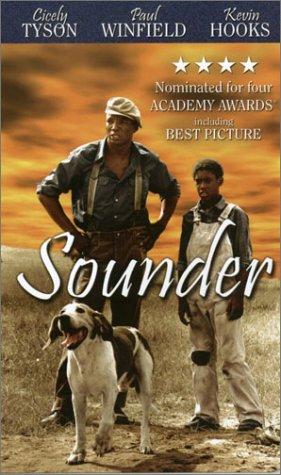The 1972 film Sounder follows the Morgans, a family of black sharecroppers living in 1930s Louisiana.
When we first see Nathan Lee Morgan (Paul Winfield) and his young son, David Lee (Kevin Hooks), they’re hunting. Accompanying them is their loyal dog, Sounder. As they hunt, two things become very obvious. Number one, David Lee is a good father who is doing his best to provide for his family under the most difficult circumstances possible. Number two, the family is desperately poor. When Nathan finally gives in to temptation and steals a ham to feed his family, the local Sheriff (James Best) shows up at the farmhouse the next day and arrests him. Nathan is taken away to prison and one of the deputies even shoots Sounder.
Fortunately, Sounder survives and so do the Morgans. Under the stern but loving leadership of their mother, Rebecca (Cicely Tyson), the Morgan children manage to bring in the season’s crops. Unfortunately, having to work out in the fields doesn’t leave much time for David Lee to get an education. When he does go to school, he and the other students listen as a middle-aged, white teacher reads to them from Huckleberry FInn.
After the wounded Sounder finally returns to the Morgan family and recovers from his wounds, David Lee decides that he wants to go to the prison and see his father. Unfortunately, the sheriff refuses to even tell the family where Nathan has been incarcerated. None of the white authority figures in town care that the Morgans are struggling or that they’ve managed to bring in the crops themselves. None of them cares or seems to even understand that David Lee is missing his father. The sheriff presents himself as being a reasonable man and is never heard to the use the n-word. Instead, he and every other white person in town refers to David Lee as being “boy,” diminishing everything that he’s done since his father was arrested.
David Lee finally figures out the location of a prison that might (or might not) currently be housing his father. It’s several miles away. Accompanied by Sounder, David Lee sets out to make the long journey to the prison. Along the way, he discovers another school and a far more empathetic teacher named Camille (Janet MacLachlan). David Lee is forced to make a decision that will effect not only his future but also the future of his family.
Sounder is a heartfelt film. It’s a film that’s less interested in telling a story with a traditional beginning and end as opposed to just sharing scenes of everyday life. In this case, it’s the life of family that manages to survive despite it often seeming as if the entire world is arrayed against them. The film was based on a book that pretty much centered around the dog. The movie, on the other hand, is more about the family and, despite the fact that the film is still named after him, the dog is pretty much superfluous to the plot. That said, Sounder still plays an important role because, just as Sounder survives being shot at and remains loyal to the people that he loves, the Morgans survive whatever adversity is tossed at them. Watching the film, the viewer is very much aware that life is never going to be easy for the Morgans but, at the same time, it’s impossible not take some comfort in the fact that they have each other. Paul Winfield and Cicely Tyson both give strong performances as the resilient Nathan Lee and Rebecca and the entire film is the type of movie that’ll inspire tears even as it inspires happiness.
At the Oscars, Sounder was nominated for Best Picture, where it provided a gentle contrast to the other nominees, Cabaret, Deliverance, The Emigrants, and The Godfather. Paul Winfield and Cicely Tyson were nominated for Best Actor and Best Actress, making 1972 the first year in which black performers were nominated in both of the lead categories. (It was also the first year in which more than one black actress was nominated for Best Actress as Tyson ended up competing with Lady Sings The Blues‘s Diana Ross.) In the end, Tyson lost to Cabaret‘s Liza Minnelli while Winfield lost to The Godfather‘s Marlon Brando. And, of course, The Godfather also went on to deservedly win the award for Best Picture.

